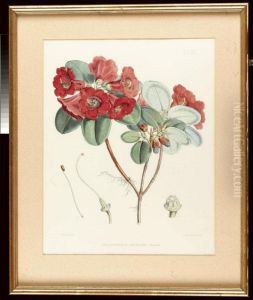Joseph Dalton Hooker Paintings
Sir Joseph Dalton Hooker was a British botanist, explorer, and close friend of Charles Darwin. He was born on June 30, 1817, in Halesworth, Suffolk, England. His father, Sir William Jackson Hooker, was a prominent botanist, and his mother was Maria Sarah Turner, daughter of a banker. Hooker was educated at the High School of Glasgow and later at the University of Glasgow, where he showed a keen interest in botany and natural science.
Hooker's contributions to botany and geographical distribution of plants were substantial. His explorations began with a voyage to Antarctica and the Southern Ocean on the HMS Erebus from 1839 to 1843. He collected numerous specimens and made extensive botanical observations. Following his Antarctic expedition, he undertook a series of other field trips to places including India, the Middle East, Morocco, the Western United States, and the Himalayas, where he collected plants and made significant contributions to the knowledge of the flora of these regions.
In 1855, Hooker published his two-volume work 'Flora of British India,' which became a fundamental reference for the study of Indian botany. He also wrote 'The Botany of the Antarctic Voyage' based on his earlier expedition. Hooker was a staunch supporter of Darwin's theory of evolution by natural selection and was one of the first to integrate these ideas into his botanical work. His analysis of geographical distribution of plants supported Darwin's theories, and he was a key advocate for the scientific community's acceptance of evolutionary biology.
Throughout his career, Hooker held several prominent positions. He succeeded his father as the Director of the Royal Botanic Gardens, Kew, in 1865, a position he held for twenty years. During his tenure, he expanded the gardens and established Kew as a leading center for botanical research. Hooker was also the President of the Royal Society from 1873 to 1878. His contributions to science were recognized with various honors, including the Copley Medal and the Darwin Medal. He was knighted in 1877 for his services to botany and the British Empire.
Joseph Dalton Hooker passed away on December 10, 1911, in Sunningdale, Berkshire, England. His legacy as one of the greatest British botanists and explorers of the 19th century lives on through his extensive collection of plants and his numerous scientific publications. His work not only enriched the field of botany but also helped shape the course of evolutionary biology.
